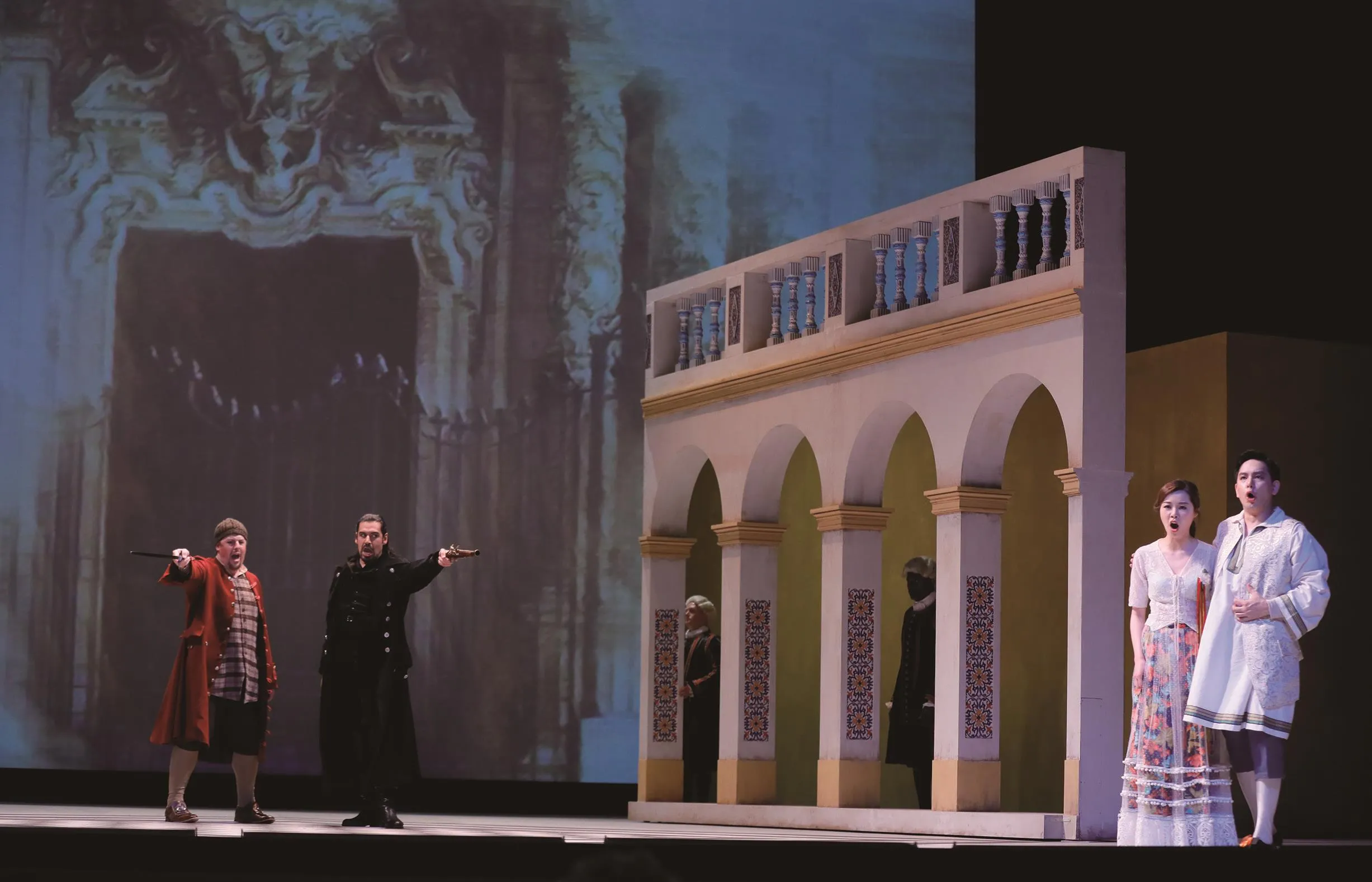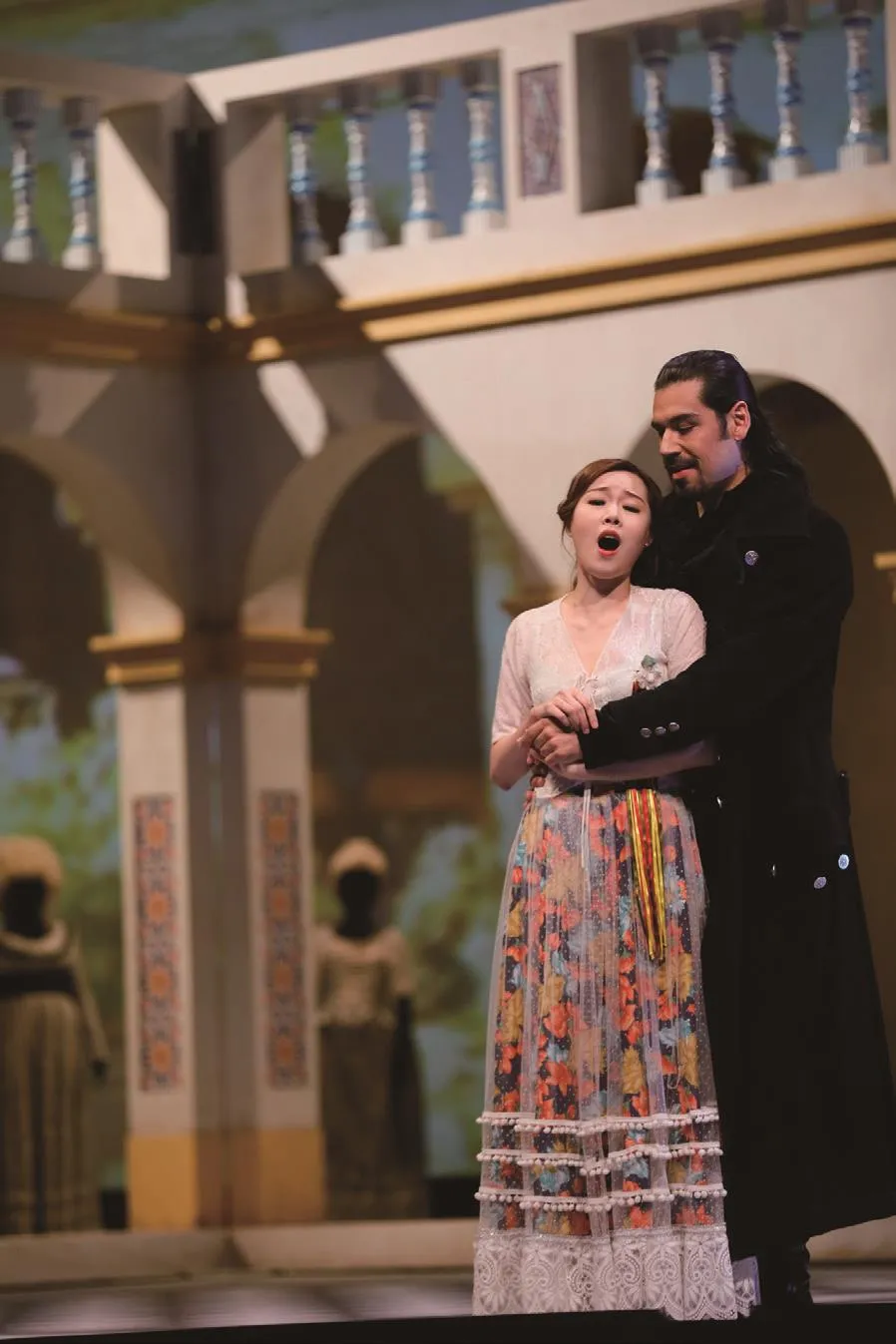新时代新绅士:莫扎特的唐乔瓦尼在“#我也是”时代何去何从
文:司马勤(Ken Smith) 编译:李正欣
还记得我的朋友苏·伍尔夫(Sue Wolf)吗?她住在洛杉矶,是一位电视喜剧编剧兼导演。不记得也情有可原,我也差不多忘了。她声称自己搬回纽约长住,但我们俩还是极少见面。她说她放弃了电视的工作,转战至舞台,但我在社交平台上只找到她引领年轻人进入剧场看戏的大合照。
不久以前,我们终于聚在一起,享用了一顿早午餐(brunch),聊天时她丢下了一个炸弹般的重磅话题。她表示,尽管她从小就热爱歌剧,但事到如今她真的再也无法忍受了。“说真的,在今天怎么去跟那些少男少女们解释歌剧啊?”她道出这个问题的时候,脸上充满沮丧。“在大张旗鼓的‘#我也是’运动时代面对那些陈腔滥调的歌剧情节,你可以问心无愧地说,是一种丰富的体验吗?”
她说得有道理。当新生代们公开抗议(甚至对簿公堂)性行为不当的个案不胜枚举时,你凭什么来维护这些专门虐待女性的经典剧目呢?几十年来,女权主义者一直在抱怨,典型的歌剧女高音的结局只有以下几个可选择——当然也得取决于她的声乐门类:被刺死(《卡门》)、被活埋(《阿依达》),或者被塞进麻袋后被乱棍毒打至死(《弄臣》)。如果她幸运一点,她可能会亲自动手,切腹自杀(《蝴蝶夫人》)或从高楼跳下(《托斯卡》)。
但另一方面,我们还有《唐乔瓦尼》这个个案。在这部莫扎特歌剧里,没有女性真正死去——唯一一个被惩罚致死的就是拈花惹草的唐乔瓦尼先生,但这部作品中的女角们遇上最差的命运,就是自己的名字被加进那臭名远播的唐乔瓦尼“情妇名单”。因为唐乔瓦尼最终被送进了地狱,我们也很难说这部歌剧是偏袒他、歌颂他的恶劣行为。
然而,要是你随便问问哪部歌剧与“#我也是”的道德观抵触最多,《唐乔瓦尼》肯定名列榜首,因为这个故事除了表现两性之间的权术,也包含了社会上不同阶层的角力。当仆人莱波雷洛连珠炮似地唱出“名单”上的伯爵夫人、男爵夫人、农家少女与家中侍婢时,你已经感觉周边人的局促不安了。上一代中机会平等的诱惑者,到了下一代,就变成了享受阶级专利的掠夺者。
不久前,我看过一出聘用全女性制作团队制作的《唐乔瓦尼》。到结局时,唐乔瓦尼染上了无法治愈的性传染病(我猜,这可算是今时今日无宗教大环境下的另一种“地狱”),他被困在医院病房里,奄奄一息。今年5月,俄克拉何马州塔尔萨歌剧院更请来了一位爱尔兰跨性别歌唱家露西亚·卢卡斯(Lucia Lucas)——现在是一位男中音——扮演唐乔瓦尼,在原有的话题上又增添了更多的性别色彩。
大都会歌剧院本演出季也重演《唐乔瓦尼》。可能因为院方对于这部作品的矛盾心理,演出推广方面好像有意无意地被忽略了。这不仅是一个极其平庸的《唐乔瓦尼》制作,也是歌剧院现有制作之中最平淡无奇的一个。就连《纽约时报》乐评人科琳娜·达·方瑟克-沃尔海姆(Corinna da Fonseca-Wollheim)——因为是位女乐评人,大家还以为她会有备而战,誓要攻击这部歌剧——描述自己坐在大都会歌剧院观众席里,“极力地寻找任何能够提起兴趣的东西”。去年4月,当勒内·雅各布斯(René Jacobs)带领弗莱堡巴洛克古乐团到深圳演出《唐乔瓦尼》的时候,他选用了纯粹音乐会形式。
你现在大概能够理解,为何当我查看今年5月香港歌剧院演出资料时,发现一场名为“在‘#我也是’年代看《唐乔瓦尼》”的讲座时,脉搏会突然加快,心里是多么兴奋。主讲者是英语字幕翻译以及节目介绍撰稿人彼得·戈登(Peter Gordon),地点是香港大学的但丁协会。彼得是位作家,也是文学专家,这场讲座让我充满期待,一方面他的发言应该经过深思熟虑,另一方面,他的演说肯定会有适当的挑衅性。
然而,当我到达香港大学时,彼得用一个简单的前提开始了他的演讲。“你们要认真理解‘#我也是’时代的《唐乔瓦尼》,就得认真聆听莫扎特的音乐。”然后他又突如其来地抛出了问题:“我们如何肯定唐乔瓦尼成功地勾引到了女性呢?如果你细心留意,在整部歌剧里,他每一次想诱惑女生,结果都是一败涂地。”他继续说道,“莱波雷洛是证明唐乔瓦尼斑斑劣迹的唯一证人,但莱波雷洛并不是世界上最可靠的证人。”

左:俄克拉何马州塔尔萨歌剧院今年5月制作的《唐乔瓦尼》,请来了跨性别歌唱家露西亚·卢卡斯饰演剧名主角

右:露西亚·卢卡斯饰演的唐乔瓦尼
唐乔瓦尼作为一个似乎无法达成目标的达官贵人形象,无疑会引发共鸣。我立刻联想到服装部门可以为这个角色设计一顶橙色的假发。狡黠的导演或许还可能安排莱波雷洛将一叠现钞塞给塞维利亚的色情女星。我的那些“特朗普式”的异想天开很快就烟消云散,回到历史环境之中。
对彼得来讲,把《唐乔瓦尼》的故事背景更新,绝对算不上创新。从历史角度来看,故事以及男主人公从一开始就经历了多次蜕变。这位放荡不羁的贵族人物出自西班牙编剧加布里埃尔·杰列茨(Gabriel Téllez)——这位编剧的笔名蒂尔索·德·莫利纳(Tirso de Molina)更为人所熟知——1630年发表的《塞维利亚的登徒子》(The Trickster of Seville and the Stone Guest)。唐乔瓦尼本来是一个恶棍,临死的一刻进入教堂忏悔,随即得到救赎而升入天堂(这也暴露了天主教义的道德漏洞)。与《金瓶梅》中的西门庆一样,唐乔瓦尼表面上是社会名流的完美代表,但内心却是真正的腐败,他的性格和行为折射出对他那个时代道德的强烈批判。

一百多年后,法国编剧让-巴蒂斯特·波克兰(Jean-Baptiste Poquelin)——更多人认识他为莫里哀(Molière)——撰写了《唐璜》(Don Juan and the Feast with the Statue)。他笔下的男主人公罪大恶极、思想自由,他的一举一动——当然也包括他的存在——时时刻刻都在不断蔑视宗教与政治当权者。在莫里哀笔下,唐乔瓦尼可算是启蒙思想的传奇人物,这位贵族拥有很多缺点,但从不逃避责任。最终,当石像邀请他一起“进餐”时,他欣然接受,没有露出一丁点畏惧。
然而,或者正因为莫里哀的作品在审查上遇到了麻烦——他的话剧演出不久就被取消,后来更经过大幅度修订——莫扎特的编剧达·蓬特正是被这一原版剧本所吸引。在许多层面上,《唐乔瓦尼》在逻辑上与《费加罗的婚礼》相互呼应,因为《费加罗》也是一位法国编剧革新性的剧本,同样也惹来了审查方的阻碍。
让我们回到香港大学的讲座上,彼得把唐乔瓦尼的故事与典故的来龙去脉叙述得有条有理。但我觉得奇怪,他以及出席的听众,显然对威尼斯贵族卡萨诺瓦(Casanova)知之甚少,而卡萨诺瓦的回忆录仍然是记录18世纪威尼斯贵族生活及风土人情的伟大文献之一。别忽视了最突出而放荡的一点:卡萨诺瓦多彩多姿的社交生活,与唐乔瓦尼的生活背景相得益彰。
究竟达·蓬特有没有看过卡萨诺瓦的回忆录我们无从稽考,但他肯定知道卡萨诺瓦。他们俩都是作家;两人都曾经当过天主教教士(尽管达·蓬特出生时是犹太人);两人都曾在威尼斯遇上麻烦后逃去了维也纳。威尼斯这个水城的面积那么小,两人绝不可能完全避免见面。最重要的是:达·蓬特的《唐乔瓦尼》与此前的版本在某些细节上有很大出入,而这些细节却与卡萨诺瓦的遭遇吻合。某些间接证据让人猜测,或者卡萨诺瓦才是剧本的“影子写手”(ghostwriter)——最起码,是“剧本医师”(script doctor),以顾问的方式增强了唐乔瓦尼这个浪荡角色的可信度。[多米尼克·阿根托(Dominick Argento,美国作曲家)1985年的歌剧《卡萨诺瓦》,与卡洛斯·绍拉(Carlos Saura,西班牙导演)2009年执导的电影《我,唐乔瓦尼》都推崇这个观点。]
讲座的下半场,请来了歌剧《唐乔瓦尼》的导演让-路易斯·格兰达(Jean-Louis Grinda),讨论香港这个歌剧制作的特点。香港的版本是由格兰达此前在蒙特卡洛歌剧院执导的版本重构出来的。简而言之,没有很大的改动——更准确地说,没有添加很多。正如彼得在最后总结的,“在‘#我也是’时代欣赏《唐乔瓦尼》的最佳方法就是去关注莫扎特与达·蓬特的手笔。”

上、左页:大都会歌剧院今年4月上演的《唐乔瓦尼》

上、右页:香港歌剧院5月上演的《唐乔瓦尼》(图片提供:香港歌剧院)
香港歌剧院成功了吗?总的来讲,做得挺好。这个制作没有把情节现代化,也没有把莫扎特的古典主义夸大为瓦格纳式的壮阔(很多人处理终场的地狱场景,往往会掉进这个陷阱)。埃里克·切瓦利埃(Eric Chevalier)的布景用上适当的拱门与瓦片,令我们联想到西班牙;罗伯托·文图里(Roberto Venturi)的灯光设计聚焦于布景,但避免产生压抑感。
莫扎特描述《唐乔瓦尼》为一部“严肃的喜剧”。导演与指挥马丁斯·奥索连斯(Martins Ozolins)从中挖掘出戏剧节奏与音乐速度,将其如法国闺房闹剧(French sex farce)一样展开,而不是落入这类闹剧经常表现的轻浮语气。理查德·奥拉萨巴(Richard Ollarsaba)饰演唐乔瓦尼与约瑟夫·巴伦(Joseph Barron)饰演莱波雷洛的演绎十分细腻,在叙事方面特别有效,在黑色幽默的段落配上相对深沉的音色。虽然唐乔瓦尼看起来英俊潇洒,他彻头彻尾都没有露出一点欢悦;莱波雷洛跟着主人的每一举动,却又充满厌恶与嫉妒。
这部歌剧的女角通常都被贬为片面的漫画式陪衬。但在这部制作里,她们的感情宽度开阔得多,显得有血有肉。邝励龄饰演活泼的埃尔薇拉,比只因为被拒而报复的女人更有深度。维多利亚·坎尼佐(Victoria Cannizzo)那正直的安娜看起来也有她不羁的一面。唯一的弱点是刘卓昕扮演的采琳娜。她本来应该是歌剧里唐乔瓦尼要勾引的最复杂的女孩,可惜她的演绎偏重典型“乡下女”,而忽略了深藏其下的“狡猾女孩”。歌剧老将田浩江饰演的骑士长,后来成为石像重返舞台时还增加了扩音,令最终一幕更加触目惊心。
在今天的大环境下,上演《唐乔瓦尼》这部具有话题性的作品极具诱惑力,香港歌剧院的制作成功地提供了佐证。但在这位贵族的头上加上光环,往往都是个别导演与演员的意愿,而不是来自故事本身的要求。有时候,久远的歌剧作品要引起如今观众的共鸣,最好的方法就是留意歌剧的本质。
Remember Sue Wolf, my comedy writer-director friend from Los Angeles? That’s okay, I barely do either.She says she’s moved back to New York, but I still never see her.She claims that she’s given up television for the stage, but all I’ve seen are the pictures she posts of young people she’s introduced to the theatre.
Not long ago we finally got together for brunch,and she dropped a bombshell.Despite her lifelong love of opera, she says she just can’t take it anymore.“Really, what can you tell teenagers today?” she exclaimed with palpable frustration.“How can youwatch these stories in the age of #MeToo and say that opera is an enriching experience?”


俄克拉何马州塔尔萨歌剧院今年5月制作的《唐乔瓦尼》
She did have a point.When an entire generation has taken to publicly protesting (and often litigating) over sexual misconduct, how can you justify a repertory famous for mistreating half the human population? Feminists have complained for decades that a typical operatic soprano has a choice—depending on her voice type—of being stabbed (Carmen), buried alive (Aida) or beaten to death in a bag (Rigoletto).If she’s lucky, she might get to take matters into her own hands and either disembowel herself (Madame Butterfly) or leap from a tall building (Tosca).
But on the other hand, there’sDon Giovanni,where no women actually die.The worst fate that the opera’s female characters face is the possibility of being consigned to Giovanni’s infamous list of romantic conquests.And because the lecherous Don eventually goes to hell, it’s hard to claim that the story really glorifies his behavior.
And yet, ask anyone to name the biggest offender of the new MeToo morality andDon Giovanniwill surely top the list, partly because there’s not just sexual politics involved but social politics as well.When Leporello rattles off countesses and baronesses as well as peasant girls and maidservants, you can already feel some people squirm.One generation’s equal-opportunity seducer is the next generation’s class-entitled predator.
Not long ago I saw aDon Giovanniby an allfemale production team where the Don wound up wasting away in a hospital ward after contracting an uncurable STD (the modern, secular equivalent of hell, I suppose).In May, Tulsa Opera in Oklahoma cheekily diffused the situation by casting the Irish transgender singer Lucia Lucas—now a baritone—in the title role.

The Metropolitan Opera, which brought itsDon Giovanniback to the stage this season, seems to express its own ambivalence through benign neglect.This is not just a supremely leadenGiovanni; it’s the most lackluster production in the company’s current repertory.EvenNew York Timescritic Corinna da Fonseca-Wollheim—who, as a woman, you’d expect to come with sabre drawn—found herself “straining to find anything of interest” in the Met’s staging.When René Jacobs broughtGiovannito Shenzhen last April with the Freiburg Baroque Orchestra, he ignored staging altogether.
So you can probably understand how my pulse started racing when, searching for information about Hong Kong’s production in May, I came across a lecture entitled “WatchingDon Giovanniin the #MeToo Era” by the production’s translator and annotator Peter Gordon, hosted by the University of Hong Kong’s Dante Alighieri Society.Given Peter’s literary credentials, the evening promised to be thoughtfully considered and appropriately provocative.
When I arrived at HKU, though, Peter opened his talk with a simple proviso: “All you need to appreciateDon Giovanniin the MeToo era is to listen to Mozart’s score.” And then he threw an unexpected curve.“How do we really know that Giovanni is such an accomplished seducer?” he asked.“If you notice,he never actually succeeds with any women in the course of the whole opera.” The only evidence of the Don’s sexual prowess is Leporello’s testimony, he continued, and Leporello is not exactly the world’s most credible witness.
This image of Giovanni as an entitled man who can’t seem to close a deal certainly struck a chord.Immediately I thought of the costume department designing an orange wig.A cunning director might arrange for Leporello to offer some hush money to the Sevillian porn stars.But those Trump-era fantasies were soon brushed away by historical context.
ReconceivingDon Giovanniis hardly a radical concept, Peter pointed out, since the story and title character have morphed many times since their inception.The libertine nobleman first sprung from the pen of Spanish playwright Gabriel Téllez—better known as Tirso de Molina—in his 1630 playThe Trickster of Seville and the Stone Guest.Juan was originally a Catholic reprobate planning to repentbefore he dies, thus entering heaven with all his sins forgiven (thus exposing a moral loophole in the Catholic faith).Much like Ximen Qing inJin Ping Mei,Juan is social perfection on the surface but truly corrupt within, his character and actions unfolding as a strong critique of the morals of his time.
More than a century later, the French playwright Jean-Baptiste Poquelin—better known as Molière—wroteDon Juan and the Feast with the Statue, this time rendering the Don as a godless freethinker,his every move—and indeed his very existence—a constant flouting of religious and political authority.As a flag bearer for Enlightenment thought, Molière’s nobleman was flawed at best, but he didn’t cower from accountability.When finally “invited to dinner”by the Statue, he faces his final comeuppance with grace and gravitas.

Despite, or maybe because of, Molière’s trouble with the censors—his play was soon withdrawn and substantially altered—this was the version that attracted Mozart’s librettist Lorenzo Da Ponte.On many levels, it was a logical successor to their earlier operaThe Marriage of Figaro, another radical script by a French playwright that drew the ire of that country’s censors.
Back at HKU, Peter did such a fine job recounting the Juan legend that I was surprised that he—or anyone else at the Dante Alighieri Society,apparently—knew so little about Casanova, the Venetian nobleman whose memoirs still stands as one of the great documents of 18th-century Venetian manners.And not to ignore the salient and salacious point, Casanova’s active and varied social life rather mirrored Don Juan’s.
Whether Da Ponte knew Casanova’s memoirs, he certainly knew Casanova.Both were writers; both spent part of their life in the Catholic priesthood(despite Da Ponte being Jewish by birth); both were run out of Venice and had to flee to Vienna.Venice is too small a town for them not to have met.But here’s the thing:Don Giovannidiffers from older versions of the Don Juan legend in several details that actually mirror Casanova’s own life.Circumstantial evidence fueled speculation that Casanova was actually the libretto’s ghostwriter—or at least its script doctor,adding details to make Giovanni a more credible seducer.(Dominick Argento’s 1985 operaCasanovaand Carlos Saura’s 2009 filmI, Don Giovanniare two accounts keeping that legend alive.)

上、左页:香港歌剧院5月上演的《唐乔瓦尼》(图片提供:香港歌剧院)
Director Jean-Louis Grinda later joined Peter in discussion to reveal what he would be bringing to the Hong Kong production, which he reconstructed from his earlier version for Opera de Monte-Carlo.In short, not much—or more precisely, not much added.As Peter later concluded, “The best way to watchDon Giovanniin the MeToo era is simply to pay attention what Mozart and Da Ponte put on the page.”
So how well did Opera Hong Kong succeed?Pretty well, for the most part.There was no attempt to modernize, or inflate Mozart’s classicism to Wagnerian dimensions (portraying hell has a way of doing that).Eric Chevalier’s sets evoked Spain with a minimum of arches and porcelain tiles; Roberto Venturi’s lighting kept the action tightly focused without becoming claustrophobic.
Taking to heart Mozart’s description of the piece as a “serious comedy,” Grinda and conductor Martins Ozolins found dramatic pacing and musical tempos that unfolded like a French sex farce while not falling into the form’s frivolous tone.Richard Ollarsaba’s Giovanni and Joseph Barron’s Leporello revealed an uncommonly subtle range of narrative nuance, often dispensing moments of dark humor with dark vocal timbres.Giovanni, his palpable charisma aside, didn’t seem to be having much fun;Leporello followed his master’s every move with a distinctive mix of disgust and envy.
The women, often dismissed dramatically as one-dimensional comic foils, also paid supreme attention to the emotional range in their roles.Louise Kwong’s lively Donna Elvira was more than a scorned conquest settling a score, Victoria Cannizzo’s upright Donna Anna rather less than a proper lady.The only weak link was Alison Lau’s Zerlina, arguably the most complicated target of Giovanni’s affections, who too often kept up a pleasant façade rather than revealing the crafty peasant beneath.Veteran bass Hao Jiang Tian’s Commendatore, particularly in his return as the Stone Guest, sang with an amplified timbre that vividly haunted the scene.
Tempting as it may be in the current climate to throwDon Giovannito the wolves, Opera Hong Kong’s production proved its point.The Don’s glorification has come more through individual directors and performers than from the story itself.Sometimes the best way for an opera to resonate with today’s audiences is simply to notice what’s there.

